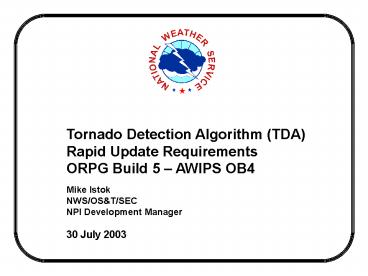Tornado Detection Algorithm TDA - PowerPoint PPT Presentation
1 / 11
Title:
Tornado Detection Algorithm TDA
Description:
Current features inherit attributes (associated storm ID, feature type, low ... Display as overlay to other products from same volume scan ... – PowerPoint PPT presentation
Number of Views:40
Avg rating:3.0/5.0
Title: Tornado Detection Algorithm TDA
1
Tornado Detection Algorithm (TDA) Rapid Update
Requirements ORPG Build 5 AWIPS OB4 Mike
Istok NWS/OST/SEC NPI Development Manager 30
July 2003
2
ORPG Build 5 WSR-88D TRU Product Functional
Requirements
- The Tornado Vortex Signature (TVS) Rapid Update
product is generated once per elevation scan - TDA Algorithm information from an elevation scan
is based on elevations that have been completed
thus far in the current volume scan - This information is combined with the previous
volume scan TDA, MDA, and Storm Track Algorithm
information - Average motion of all tracked MDA features from
the previous volume is used to derive forecast
positions of previous TVS features at the current
volume scan time - - If average MDA motion is unavailable, average
SCIT motion is used. - In priority rank order(TVS types before ETVSs,
and within each type ranked by Low-level Delta
Velocity (from the greatest to least)), the
forecast position of each previous feature is
matched to the closest current feature within a
search radius defined by SCIT algorithm - - Current unmatched 3D features are New
- - If previous volume is unavailable, all
features are New
3
ORPG Build 5 WSR-88D TRU Product Functional
Requirements(cont.)
- Current features inherit attributes (associated
storm ID, feature type, low-level delta velocity,
maximum delta velocity and its height, average
delta velocity, maximum shear and its height,
base and top heights, depth, and base azimuth and
range) of the matched previous feature - Position attributes (base azimuth, range, and
height) of matched previous features are always
updated to the current detection - Persistent. Maximum delta velocity, average
delta velocity, and maximum shear are update to
the current if increasing in magnitude. - - If the maximum delta velocity or shear is
updated, the height of that - attribute is also updated.
- Increasing. Strength attributes (feature type,
low-level delta velocity, depth) are updated to
the current value, if increasing in magnitude. - - Top height and depth is updated if the top of
the current detection is taller - New. All attributes of unmatched current (new)
features are provided. - Extrapolated. Position attributes (base azimuth
and range only) of unmatched previous features
are extrapolated to the forecast position. - Feature status categories are persistent,
increasing, new, and extrapolated - At the end of the volume scan extrapolated
features are removed
4
ORPG Build 5 WSR-88D TRU Product Functional
Requirements(concluded)
- Product is used to generate a graphic display,
graphic overlay to other products, and
alphanumeric displays - Product includes annotations for the product
name, date and time of volume scan, and elevation
angle - Product format requirements
- Graphic 3D feature symbols
- 3D features that are new, persistent, increasing,
or extrapolated - Packet 20 to report current (new, persistent,
increasing) and extrapolated TVS and ETVS
features - Identify storm ID associated with each TVS
feature - Position the storm ID relative to the storm cell
centroid - Graphic alphanumeric table
- Features that are new, persistent, increasing, or
extrapolated - Display character (8-bit hexadecimal 5E) next
to current data - Tabular alphanumeric table
- Features that are new, persistent, increasing, or
extrapolated - Increasing, persistent, and extrapolated features
- Display character (8-bit hexadecimal 5E) next
to current data - TDA features are listed in priority rank order
- Note The TDA requires 3 elevation scans to
identify a feature.
5
Standard TVS Product Examples
6
TRU Graphic Alphanumeric Block (GAB)
7
TRU Tabular Alphanumeric Block (TAB)
8
TRU Product Sample
9
TRU Overview and Terminology
10
AWIPS OB4 Functional Requirements
- TDA Rapid Update (ORPG Build 5 generates new
elevation based product, based on user request) - User requests the TRU product three different
ways - All elevations, lowest x elevations, specific
elevation angles - Can archive and read-back all TRU products
- Display as overlay to other products from same
volume scan - User option to choose between displaying the
latest elevation (i.e., highest elevation) and
displaying a specific elevation - When the latest elevation is selected, the
display will automatically update when higher
elevation products are received - Highest elevation TRU is used as overlay in time
loops - Negative condition (no TVS features) must be
displayed - Annotate displays with elevation angle of the TRU
product
11
AWIPS OB4 Functional Requirements
- TDA Rapid Update D2D display requirements
- Graphic display of TVS and ETVS feature icons
- Display traditional AWIPS TVS and ETVS symbols
for current and use slightly different symbols
(e.g., right triangle centered on the right
angle) for extrapolated features - Toggle to turn off display of extrapolated
features - Graphic alphanumeric table (grid/text D2D
display) - Display like other graphic alphanumeric products
- Tabular alphanumeric table (AWIPS text viewer)
- Store/display like other tabular alphanumeric
products

